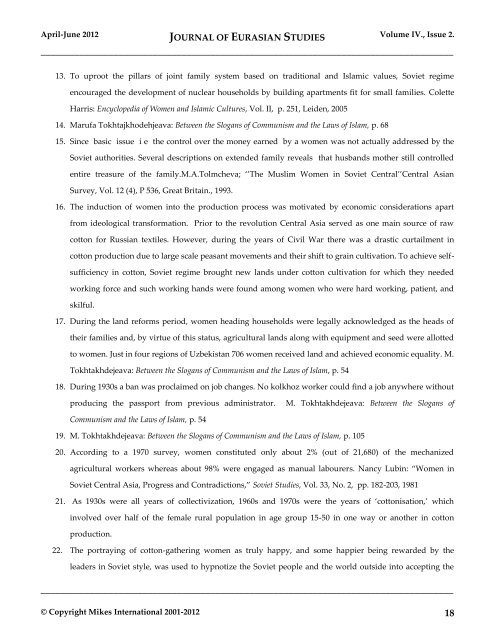You also want an ePaper? Increase the reach of your titles
YUMPU automatically turns print PDFs into web optimized ePapers that Google loves.
April-June 2012 JOURNAL OF EURASIAN STUDIES Volume IV., Issue 2.<br />
_____________________________________________________________________________________<br />
13. To uproot the pillars <strong>of</strong> joint family system based on traditional and Islamic values, Soviet regime<br />
encouraged the development <strong>of</strong> nuclear households by building apartments fit for small families. Colette<br />
Harris: Encyclopedia <strong>of</strong> Women and Islamic Cultures, Vol. II, p. 251, Leiden, 2005<br />
14. Marufa Tokhtajkhodehjeava: Between the Slogans <strong>of</strong> Communism and the Laws <strong>of</strong> Islam, p. 68<br />
15. Since basic issue i e the control over the money earned by a women was not actually addressed by the<br />
Soviet authorities. Several descriptions on extended family reveals that husbands mother still controlled<br />
entire treasure <strong>of</strong> the family.M.A.Tolmcheva; ‘’The Muslim Women in Soviet Central’’Central Asian<br />
Survey, Vol. 12 (4), P 536, Great Britain., 1993.<br />
16. The induction <strong>of</strong> women into the production process was motivated by economic considerations apart<br />
from ideological transformation. Prior to the revolution Central Asia served as one main source <strong>of</strong> raw<br />
cotton for Russian textiles. However, during the years <strong>of</strong> Civil War there was a drastic curtailment in<br />
cotton production due to large scale peasant movements and their shift to grain cultivation. To achieve self-<br />
sufficiency in cotton, Soviet regime brought new lands under cotton cultivation for which they needed<br />
working force and such working hands were found among women who were hard working, patient, and<br />
skilful.<br />
17. During the land reforms period, women heading households were legally acknowledged as the heads <strong>of</strong><br />
their families and, by virtue <strong>of</strong> this status, agricultural lands along with equipment and seed were allotted<br />
to women. Just in four regions <strong>of</strong> Uzbekistan 706 women received land and achieved economic equality. M.<br />
Tokhtakhdejeava: Between the Slogans <strong>of</strong> Communism and the Laws <strong>of</strong> Islam, p. 54<br />
18. During 1930s a ban was proclaimed on job changes. No kolkhoz worker could find a job anywhere without<br />
producing the passport from previous administrator. M. Tokhtakhdejeava: Between the Slogans <strong>of</strong><br />
Communism and the Laws <strong>of</strong> Islam, p. 54<br />
19. M. Tokhtakhdejeava: Between the Slogans <strong>of</strong> Communism and the Laws <strong>of</strong> Islam, p. 105<br />
20. According to a 1970 survey, women constituted only about 2% (out <strong>of</strong> 21,680) <strong>of</strong> the mechanized<br />
agricultural workers whereas about 98% were engaged as manual labourers. Nancy Lubin: “Women in<br />
Soviet Central Asia, Progress and Contradictions,” Soviet <strong>Studies</strong>, Vol. 33, No. 2, pp. 182-203, 1981<br />
21. As 1930s were all years <strong>of</strong> collectivization, 1960s and 1970s were the years <strong>of</strong> ‘cottonisation,’ which<br />
involved over half <strong>of</strong> the female rural population in age group 15-50 in one way or another in cotton<br />
production.<br />
22. The portraying <strong>of</strong> cotton-gathering women as truly happy, and some happier being rewarded by the<br />
leaders in Soviet style, was used to hypnotize the Soviet people and the world outside into accepting the<br />
_____________________________________________________________________________________<br />
© Copyright Mikes International 2001-2012 18
















